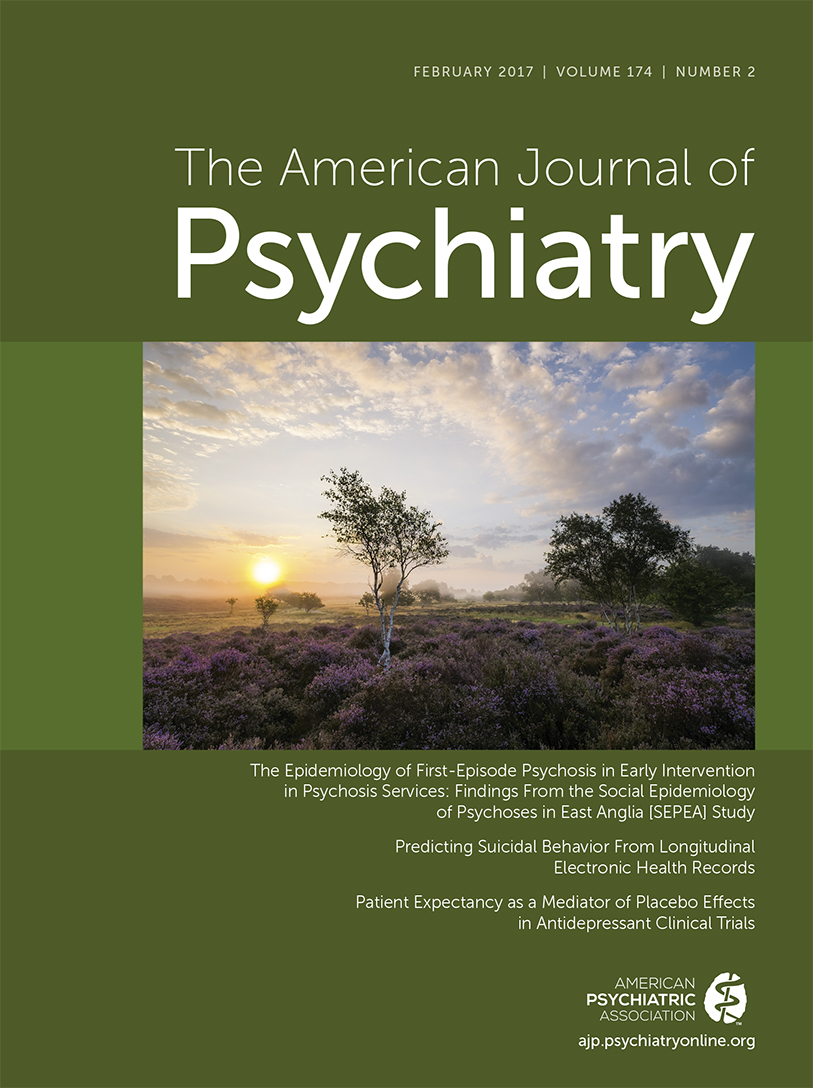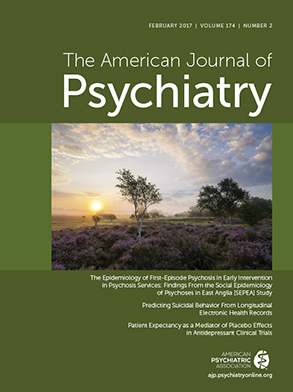Placebo effects are defined as changes in the context of an intervention that does not have the inherent powers of any active procedure. The primary reason for placebo-controlled trials is to control for factors such as regression to the mean, spontaneous improvement, and rater bias (
1). Apart from that, it is also an interesting question whether placebo may be an “active” intervention in itself (
2). That is the question discussed in an article by Rutherford et al. in this issue (
3).
The authors compare the medication responses in a placebo-controlled blind trial with the responses in an open-label comparator trial. They measured expectancy, as this is known to be related to placebo response (
4,
5), before and after randomization assignment. Expectancy is the individual’s belief about whether and how much he or she will improve as the consequence of a treatment intervention. Rutherford et al. used the Credibility and Expectancy Scale, through which respondents were asked: “Compared with now, I think my depression at the end of this study will be…” and asked to respond along a 7-point scale from “much worse” to “much better.”
Expectancy scores increased from pre- to postrandomization assessment in the open-label group but not in the blind placebo-controlled group. The response rate was 53.8% for open-label and 45% for blind placebo-controlled citalopram. Similarly, the remission rate was 34.6% for open-label and 20% for blind placebo-controlled citalopram. The interpretation is that patients who know that they are getting an antidepressant drug have better treatment expectancy and also show better treatment outcome than patients who are unsure about their actual treatment. This finding replicates findings from similar studies, but at the same time raises further questions. The authors postulate that expectancy “may directly modulate depression-associated dysfunctions in the brain, perhaps akin to what is observed in neuroimaging studies of placebo analgesia.” They also point to psychological explanations, such as increasing behavioral activation, improving medication compliance, and enhancing the therapeutic alliance between patient and doctor. As Weimer et al. (
6) have observed, “predictors of the placebo response are still to be discovered, as the response probably has more than one mediator, and different and distinct moderators are probably what cause the placebo response.”
Of special interest is uncertainty, which is in general an unconditional cause of apprehension and anxiety. “Uncertainty intolerance” is known to be a problem in many mental disorders, such as generalized anxiety disorders and depression (
7). Therefore, not knowing whether one is being treated with active medication or not, which is at the core of placebo-controlled trials, is a source of uncertainty and may induce negative emotions. It is therefore an open question whether Rutherford et al. measured an improvement of expectancy and concomitantly depression in the open-label condition or rather a blockade of improvement under uncertainty conditions in the blind condition—that is, a “nocebo” effect (
4,
8,
9). A further interesting factor is “optimism.” Positive psychology (
10) has been shown to have an impact on well-being. Knowing that something is going to happen induces optimism, and optimism is related to positive feelings and a reduction in depressive symptoms. There is furthermore “cognitive reframing”; the interpretation, perception, and meaning of events, rather than reality per se, is what governs our emotional responses (
5). Knowing that treatment started may lead to new interpretations of the same facts.
What can be learned from placebo/nocebo research? It is old knowledge in the therapeutic arts in general and in pharmacotherapy in particular that it is important how active treatment is embedded, conveyed, or “sold” to the patient. Rickels et al. (
11), already in the early days of psychopharmacology, pointed to the “importance of unspecific factors in drug therapy,” such as therapeutic optimism or the patient-physician relationship, which some researchers even think is the primary factor in psychotherapy effectiveness (
12,
13). Research on placebo effects can help explain how clinicians can be therapeutic agents in the ways they relate to their patients (
2).
Although there are many open scientific questions in regard to the placebo problem (
2,
6,
14), this does not impede the drawing of some simple conclusions for clinical practice. Rutherford et al. state that the optimal strategy in clinical practice may be to combine active medication with a presentation that enhances patient expectancy, which may involve educating patients about the effectiveness of the prescribed medication and utilizing a confident and enthusiastic interpersonal style. Learning from placebo research, this could mean more specifically:
1.
Uncertainty: Do not leave the patient uncertain about treatment effects. Even if the therapist feels unsure about the prognosis, it is reasonable to tell the patient that this is the best treatment available.
2.
Optimism: Induce hope and optimism. Tell the patient that the treatment will work and the future will be fine.
3.
Cognitive reframing: Help the patient look for improvement and recognize positive changes, whether they are treatment-related or not.
4.
Guidance: Use suggestion to convey the optimistic message (
4,
15). Tell the patient how he or she should feel. If it is important what the patient expects, it is important to tell him or her what to expect.
When talking about the deliberate use of placebo as treatment agent, there is always the question of ethics, as therapists must not mislead patients. This may also be said about “psychological placebos” such as optimistic promises that may be true or not, or the use of suggestion without telling the patient what is actually going on. But it is also an ethical question whether it is allowed to let the patient suffer in the name of truth or to expose him or her to nocebo effects. It is in any case ethical to say that therapists should avoid nocebo and foster placebo effects.

